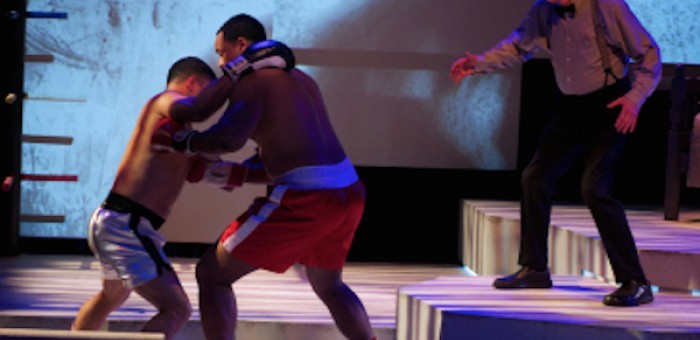Jan 13, 2026 2:09 PM
More Trump-Kennedy Center Cancellations
The fallout from the renaming of the John F. Kennedy Center for the Performing Arts to include President Donald…

Victor Ryan Robertson (left) Kenneth Kellogg and Mark Hernandez in the production of Terence Blanchard’s Champion: An Opera In Jazz
(Photo: Bill Evans)Trumpeter Terence Blanchard’s ambitious Champion: An Opera in Jazz, about the late bisexual boxer Emile Griffith, had its West Coast debut at the SFJAZZ Center on Feb. 19. A co-presentation of host SFJAZZ and Opera Parallèle, it features music that Blanchard reworked from the original production that premiered at the Opera Theater of St. Louis in June 2013.
The pairing of the two organizations proved a perfect match: Blanchard has been an SFJAZZ Resident Artistic Director, and his quintet performed his A Tale Of God’s Will (A Requiem for Katrina) with Conductor Nicole Paiement and Opera Parallèle at the Center last April.
Founded by Artistic Director Paiement, the San Francisco-based Opera Parallèle specializes in performing contemporary chamber operas in intimate spaces. The SFJAZZ Center dance-floor configuration, with seats removed in front for an orchestra pit that extended around both sides of the bandstand, was a perfect match.
The stage itself was set up on four levels—a single flat platform in front and three elevated platforms at the back spanning from left to right. The highest and furthest to the back platform was the setting for the bedroom of latter day Griffith, masterfully played by bass and role originator Arthur Woodley.
Layers proved to be a theme throughout Champion. Four square and rectangular monitors overlapped to create an collage-like video screen that hung stage right. It housed images such as abstract monochrome nature scenes; the gym where the younger Griffith (charismatically portrayed by bass-baritone Kenneth Kellogg) trains; and the boxing rings where he fought.
Time was also layered, as the elder Griffith reflected back to his upstart youth and even his childhood. Griffith himself was a multi-faceted immigrant from the U.S. Virgin Islands who had aspirations to be a singer, baseball player and hat designer.
Champion opens with surprisingly appropriate overture. A punching bag becomes a rhythmic instrument as it is pummeled hypnotically and with increasing intensity and rapidity at the rear right side of the stage.
The senior Griffith is then introduced in a confused state as he tries to locate a missing shoe. It’s one of several ways that Champion also ties into current events. Concussions and CTE (Chronic Traumatic Encephalopathy) are frequent topics of conversation today, and Griffith suffered from the similar malady of dementia pugilistica, or punch-drunk syndrome.
Act I alternates between the present and flashbacks, going from Griffith’s youth in St. Thomas and his early days in New York to his discovering a gay bar in Manhattan and the historic fight against Benny “The Kid” Paret at which he put his trash-talking opponent into a coma. The final scene is fortified by video footage of the actual fight.
With a chamber orchestra brought aboard by Opera Parallèle and a trio with pianist Edward Simon, double bassist Marcus Shelby and drummer Jaz Sawyer (courtesy of SFJAZZ), Blanchard maximized his broad yet flexible sonic palate. SFJAZZ Collective member Simon was once a member of Blanchard’s quintet, adding another layer of connectivity to the project.
It’s revealed in Act II that Paret died 10 days later. Griffith is deeply haunted by the incident until meeting with his son, Benny Jr. In between, he marries, goes through an extensive losing streak and is the victim of a hate crime.
Though Champion is in English, supertitles of Michael Cristofer’s lyrics are helpfully projected above the stage. Countering the recent #OscarsSoWhite trend, the chorus (which morphs from St. Thomas natives to ringside news reporters and photographers to gay club regulars) was ethnically diverse.
Blanchard’s skills as a composer and storyteller are at full strength here. He’s particularly effective when he has two or even four vocal lines harmonizing at once, which recalls multiple horns on the front line of a

Belá Fleck during an interview with Fredrika Whitfield on CNN.
Jan 13, 2026 2:09 PM
The fallout from the renaming of the John F. Kennedy Center for the Performing Arts to include President Donald…

Peplowski first came to prominence in legacy swing bands, including the final iteration of the Benny Goodman Orchestra, before beginning a solo career in the late 1980s.
Feb 3, 2026 12:10 AM
Ken Peplowski, a clarinetist and tenor saxophonist who straddled the worlds of traditional and modern jazz, died Feb. 2…

The success of Oregon’s first album, 1971’s Music Of Another Present Era, allowed Towner to establish a solo career.
Jan 19, 2026 5:02 PM
Ralph Towner, a guitarist and composer who blended multiple genres, including jazz — and throughout them all remained…

Rico’s Anti-Microbial Instrument Swab
Jan 19, 2026 2:48 PM
With this year’s NAMM Show right around the corner, we can look forward to plenty of new and innovative instruments…

Richie Beirach was particularly renowned for his approach to chromatic harmony, which he used to improvise reharmonizations of originals and standards.
Jan 27, 2026 11:19 AM
Richie Beirach, a pianist and composer who channeled a knowledge of modern classical music into his jazz practice,…